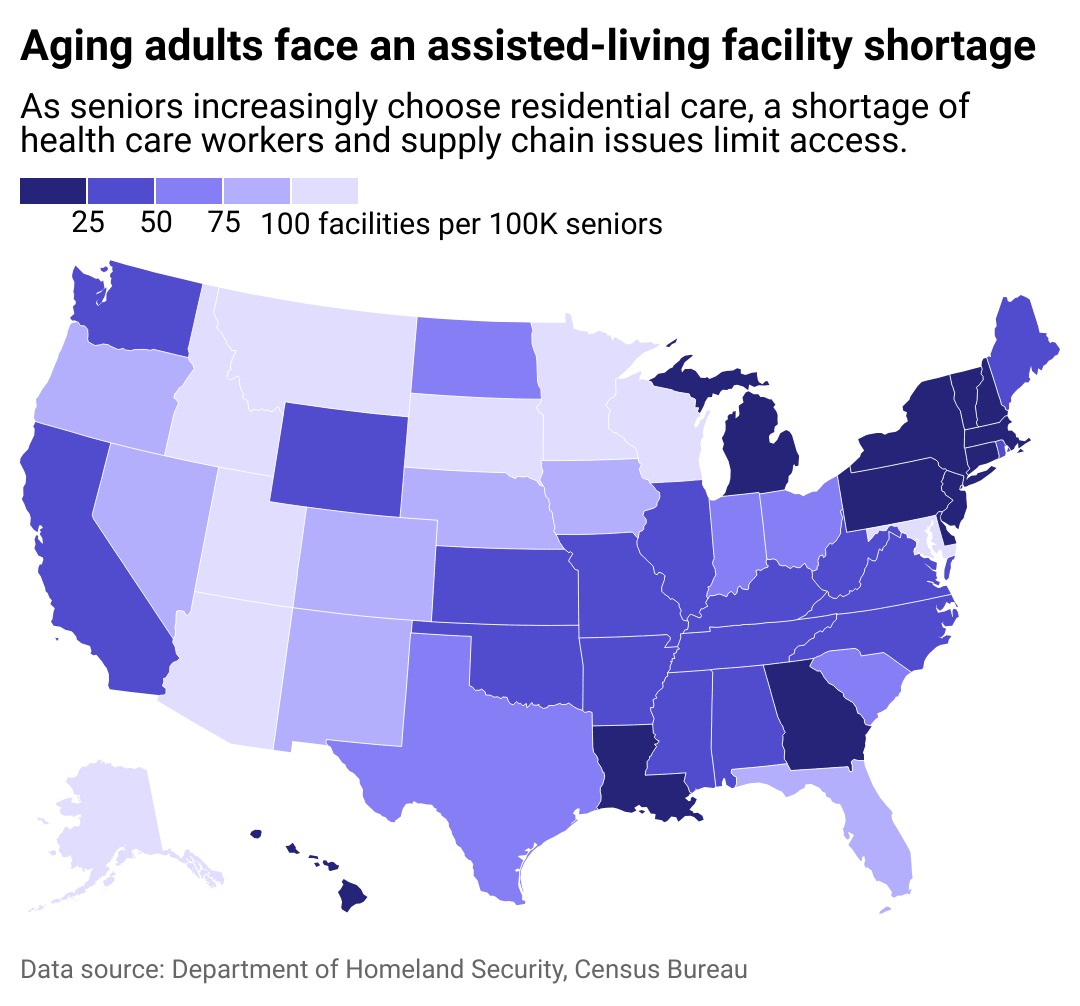
This story originally appeared on Compare Home Health Care Agencies and was produced and distributed in partnership with Stacker Studio.
States with the most assisted-living facilities per capita
The United States is facing a caregiving crisis.
As America's population ages and adults are staying active for longer, many are choosing to live in assisted-living facilities.
Assisted-living facilities offer 24-hour care but are less hands-on than nursing homes. They can offer the best of both worlds for a generation that values independence. Still, low staffing levels are causing facilities to raise prices and, in some cases, close their doors entirely, exacerbating an already severe care gap.
Residents of assisted-living facilities generally have their own apartments with shared amenities, offering more privacy and autonomy. They are also typically less expensive than nursing homes or home care.
Compare Home Health Care Agencies examined data compiled by the Department of Homeland Security's Geospatial Management Office to find which parts of the country have the highest rate of assisted-living facilities per 100,000 residents over 65. While facilities have varying numbers of beds that can accommodate more patients, the number of facilities is used since bed data was not available for some states.
After dipping in 2020, occupancy rates at assisted-living facilities have largely recovered since the COVID-19 pandemic—faster than nursing homes and independent living communities. However, tough working conditions, like being able to lift patients and deal with stressed and angry family members, combined with low wages, have caused a workforce shortage.
Fewer nurses and other medical professionals on staff can lead to a lack of individual attention and care. To remedy this, the Centers for Medicare and Medicaid Services implemented requirements in April 2024 to increase staff-to-patient ratios; however, senior living facilities say the new staffing rules, which will be phased in over the next five years, are onerous.
The result is a face-off between government regulations and the private sector, which has been criticized for maximizing profits while not meeting patient needs and, in some cases, abuse and neglect.

How states are preparing for an aging population
Since states, rather than the federal government, regulate assisted-living facilities, the quality and cost of care can vary greatly depending on location.
In Michigan, there is only one assisted-living facility per 100,000 residents over 65. According to a March 2024 State of Reform report, the state estimated that it is short 36,000 direct care workers, including certified nursing assistants, and that more than a third of nursing homes are turning away new patients every month.
Alaska, on the other hand, has the most assisted-living facilities per capita as more Americans decide to retire in the Last Frontier. In the last decade, the number of residents between 65 and 74 nearly doubled, according to the state's Health Department, and developers have built facilities accordingly. However, the cost of care is among the highest in the nation. Alaskans pay about $7,250 per month for assisted living, 35% higher than the national average.
To rectify disparities, states have tried to boost home-based care by increasing workers' pay and offering training programs. At the federal level, the Senate held its first hearing on assisted-living facilities in two decades in January, calling for increased oversight.
Since then, members of the Senate Special Committee on Aging have requested that the Government Accountability Office examine how much the federal government spends on assisted-living facilities each year. They are also soliciting information on quality and cost of care from families who have navigated the system.
Story editing by Alizah Salario. Additional editing by Kelly Glass. Copy editing by Paris Close. Photo selection by Ania Antecka.



